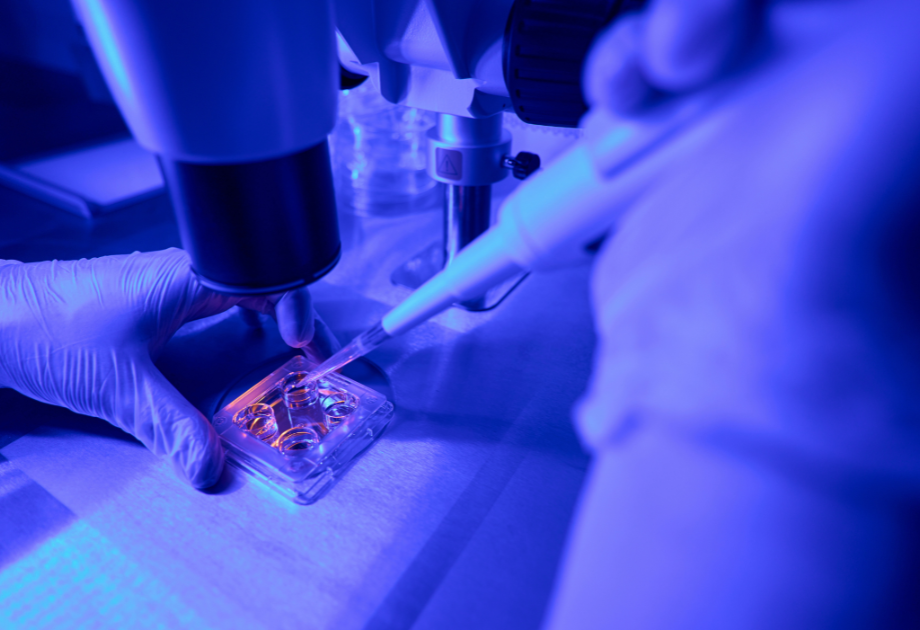Advanced Fertility Treatments to Empower Men Facing Fertility Issues?
.png)
Fertility challenges can feel like an overwhelming and unexpected roadblock, but here’s the truth: they’re more common than you might think—and with today’s advancements, there’s more hope than ever to build the family you dream of.
Male fertility issues are responsible for about 20% of infertile couples and are a contributing factor to another 30-40% of cases, according to the American Urological Association. Thankfully, advanced treatments are breaking barriers, offering hope and solutions for men ready to take the next step in their journey. Let’s dive into the possibilities and explore how these treatments can empower you.

Navigating the Emotional Side of Fertility Challenges
Addressing fertility challenges can be both a physical journey and an emotional one. Many men experience feelings of frustration, inadequacy, or isolation, but seeking help is a powerful act of strength and hope.
Here are strategies to navigate the emotional side of fertility:
- Open Communication with Your Partner: Honest discussions can strengthen your connection, ease tensions, and help you feel supported throughout the journey.
- Consider Counseling or Support Groups: Professional counseling or peer support groups provide a safe space to process emotions, share experiences, and gain encouragement from others in similar situations.
- Practice Stress Management Techniques: Activities like meditation, yoga, or journaling can help reduce stress and improve emotional well-being during treatment.
- Stay Physically Active: Regular exercise improves mood, supports hormonal balance, and enhances overall health, which can positively impact fertility.
- Engage in Mindfulness and Relaxation: Techniques such as deep breathing, guided imagery, or progressive muscle relaxation build resilience and help manage the stress of fertility challenges.
- Connect with Others: Join online communities or local groups to find support, share stories, and build relationships with people who understand the challenges you’re facing.
Taking care of your emotional health is just as important as addressing the physical aspects of fertility.

Lifestyle Changes That Support Male Fertility
Before diving into advanced treatments, there are simple lifestyle changes you can implement to improve your fertility. Think of these as a checklist to boost sperm health:
1. Dietary Adjustments
- Incorporate foods rich in antioxidants (e.g., berries, spinach, nuts) to protect sperm from damage.
- Add zinc- and selenium-rich foods like eggs, fish, and whole grains to support sperm production.
- Avoid excessive caffeine and processed foods, which can negatively affect fertility.
2. Exercise Wisely
- Moderate exercise can help maintain healthy hormone levels and reduce stress.
- Avoid overtraining, which may decrease testosterone levels and impact fertility.
3. Stay Cool
- Heat in the groin area can lower sperm production. Avoid hot tubs, saunas, and tight-fitting underwear or pants. Opt for looser clothing to improve airflow and maintain healthy temperatures.
4. Reduce Harmful Exposures
- Limit contact with toxins such as pesticides, heavy metals, and chemicals like BPA found in plastics.
- Quit smoking and minimize alcohol consumption, as both can reduce sperm count and quality.
5. Consider Supplements
- Supplements like Coenzyme Q10 (CoQ10), vitamin D, and folic acid have been linked to improved sperm health. While research is ongoing, these options are safe for most men and could provide benefits.
By addressing these factors, you may see noticeable improvements in your fertility.

Common Causes of Male Fertility Issues
If lifestyle changes don’t lead to the desired results, it’s important to understand the common causes of male infertility. These include:
- Low Sperm Count: A low number of sperm per ejaculation reduces the likelihood of conception.
- Poor Sperm Motility: Sperm’s ability to move efficiently is crucial for fertilizing an egg.
- Hormonal Imbalances: Issues with testosterone or other male hormones can impair sperm production.
- Structural Conditions: Varicoceles (enlarged veins in the scrotum) or blockages in the reproductive tract can prevent sperm from reaching the egg.
Diagnostic tools like semen analysis and hormonal monitoring can identify these issues and guide treatment decisions.

Advanced Fertility Treatments Tailored for Men
For men experiencing persistent fertility challenges, advanced medical treatments can provide targeted solutions to overcome obstacles and pave the way toward parenthood. These treatments address specific causes of infertility and offer a range of options tailored to individual needs.
Surgical Interventions for Structural Issues
Some fertility issues arise from physical blockages or conditions like varicoceles, which are swollen veins in the scrotum. These can impede sperm production and quality. Surgical options include:
- Varicocele Repair: This procedure improves blood flow and sperm quality, often leading to increased sperm count and motility.
- Sperm Retrieval Techniques: For men with blockages or low sperm production, procedures like TESE (Testicular Sperm Extraction), TESA (Testicular Sperm Aspiration), and MESA (Microsurgical Epididymal Sperm Aspiration) help retrieve viable sperm directly from the testes or epididymis for use in assisted reproductive techniques.
These interventions are typically outpatient procedures with short recovery times.
Medication and Hormonal Therapies
For men with hormonal imbalances or conditions affecting testosterone production, medication can play a pivotal role. Options include:
- Clomiphene Citrate: Often used to increase testosterone and stimulate sperm production.
- Gonadotropins: Hormones like hCG and FSH are administered to promote sperm production in men with low sperm count caused by hormonal deficiencies.
- Letrozole: This medication is sometimes prescribed to correct hormonal imbalances and boost sperm quality.
Hormonal therapies require close monitoring to track progress and make adjustments, but they have shown significant success in helping men restore their fertility.
Assisted Reproductive Techniques (ART)
ART has revolutionized the field of male fertility, offering options to address even the most challenging cases.
- Intracytoplasmic Sperm Injection (ICSI):
This groundbreaking technique involves injecting a single sperm directly into an egg, bypassing issues like low motility or abnormal sperm shape. ICSI is especially beneficial for men with severe sperm abnormalities or low sperm count. With fertilization rates ranging from 50% to 80%, according to IVI UK, it has become a cornerstone of fertility treatment. - IVF Combined with ICSI:
While traditional IVF relies on natural fertilization in a lab setting, pairing it with ICSI maximizes the chances of successful fertilization, particularly for male-factor infertility. This combined approach addresses both partners' needs and offers a streamlined path to conception. - Sperm Freezing and Banking:
For men undergoing treatments like chemotherapy or those looking to preserve their fertility for the future, sperm freezing ensures viable sperm is available when needed. This option can also support men pursuing ART at a later date. It’s important to note that The Fertility Wellness Institute does not offer this service, but we can help you find facilities that do.
Donor Sperm
When other treatments are not an option, donor gametes provide an alternative path to parenthood. The process is highly personalized and supported by a compassionate team to ensure couples feel empowered in their decisions.
Already Making These Changes? Take the Next Step with The Fertility Wellness Institute of Ohio
If you’ve already checked off the lifestyle changes but need further help, a sperm test is the next step. Diagnostic tools like a semen analysis can provide valuable insights into your fertility health.
Contact The Fertility Wellness Institute of Ohio today to schedule a consultation and learn about our advanced treatments.
Follow us on Facebook, Instagram, X, and LinkedIn for more resources and updates.
Do you want to share your fertility journey with the Fertility Wellness Institute of Ohio? Share your story here!

